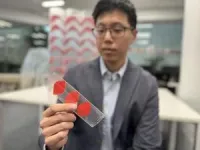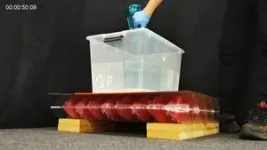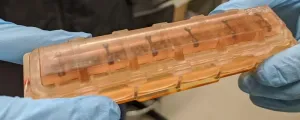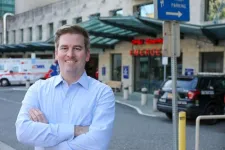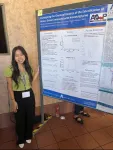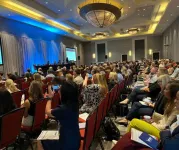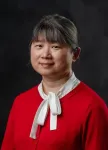(Press-News.org) Engineers at RMIT University have designed an innovative tubular structural system that can be packed flat for easier transport and pop up into strong building materials.
This breakthrough is made possible by a self-locking system inspired by curved-crease origami — a technique that uses curved crease lines in paper folding.
Lead researchers, Dr Jeff (Ting-Uei) Lee and Distinguished Professor Mike (Yi Min) Xie, said bamboo, which has internal structures providing natural reinforcement, inspired the tube design.
“This self-locking system is the result of an intelligent geometric design,” said Lee from RMIT’s School of Engineering.
“Our invention is suitable for large-scale use — a panel, weighing just 1.3 kg, made from multiple tubes can easily support a 75 kg person.”
Flat-pack tubes are already widely used in engineering and scientific applications, such as in biomedical devices, aerospace structures, robotics and civil construction, including pop-up buildings as part of disaster recovery efforts.
The new system makes these tubes quicker and easier to assemble, with the capability to automatically transform into a strong, self-locked state.
“Our research not only opens up new possibilities for innovative and multifunctional structural designs, but it can also significantly improve existing deployable systems,” said Xie from the School of Engineering.
“When NASA deploys solar arrays, for example, the booms used are tubes that were packed flat before being unfurled in space,” Lee said.
“These tubes are hollow though, so they could potentially deform under certain forces in space. With our new design, these booms could be a stronger structure.”
The research is published in the prestigious journal Proceedings of the National Academy of Sciences (PNAS). Other contributors to this work include Drs Hongjia Lu, Jiaming Ma and Ngoc San Ha from RMIT’s School of Engineering and Associate Professor Joseph Gattas from the University of Queensland.
Xie said their smart algorithm enabled control over how the structure behaved under forces by changing the tube orientations.
“With our origami-inspired innovation, flat-pack tubes are not only easy to transport, but they also become strong enough to withstand external forces when in use,” Xie said.
“The tube is also self-locking, meaning its strong shape is securely locked in place without the need for extra mechanisms or human intervention.”
Next steps
The team will continue to improve the design and explore new possibilities for its development.
“We aim to extend the self-locking feature to different tube shapes and test how the tubes perform under various forces, such as bending and twisting,” Lee said.
“We are also exploring new materials and manufacturing methods to create smaller, more precise tubes.”
The team is developing tubes that can deploy themselves for a range of applications without needing much manual effort.
“We plan to improve our smart algorithm to make the tubes even more adaptable and efficient for different real-world situations,” Xie said.
‘Self-locking and stiffening deployable tubular structures’ is published in the PNAS journal.
MULTIMEDIA AVAILABLE FOR MEDIA USE
Images and video related to the research are available for download and use here: https://spaces.hightail.com/space/4Chw6AdlhA
You can download eight videos from the research team of the innovation, ranging from showing how it pops up to its strength under different circumstances (Movie S1 to Movie S8): https://www.pnascentral.org/cgi-bin/main.plex?el=A5B4EYDm6B4MhNm5F2A9ftdwbGIlvYBilpFW1SuQnSwZ
END
New origami-inspired system turns flat-pack tubes into strong building materials
2024-09-23
ELSE PRESS RELEASES FROM THIS DATE:
Low gravity in space travel found to weaken and disrupt normal rhythm in heart muscle cells
2024-09-23
Johns Hopkins Medicine scientists who arranged for 48 human bioengineered heart tissue samples to spend 30 days at the International Space Station report evidence that the low gravity conditions in space weakened the tissues and disrupted their normal rhythmic beats when compared to earth-bound samples from the same source.
The scientists said the heart tissues “really don’t fare well in space,” and over time, the tissues aboard the space station beat about half as strong as tissues from the same source kept on Earth.
The findings, ...
New approach to defibrillation may improve cardiac arrest outcomes
2024-09-23
Joshua Lupton, M.D., has no memory of his own cardiac arrest in 2016. He only knows that first responders resuscitated his heart with a shock from a defibrillator, ultimately leading to his complete recovery and putting him among fewer than one in 10 people nationwide who survive cardiac arrest outside of a hospital.
He attributes his survival to the rapid defibrillation he received from first responders — but not everybody is so fortunate.
Now, as lead author on a new observational study published in the journal JAMA Network Open, he and co-authors from Oregon Health & Science University ...
UTA undergraduate researcher wins state honor
2024-09-23
A student studying biological chemistry at The University of Texas at Arlington earned a state-wide award for her research on diazo compounds, the building blocks of some medications. Jenny Hoang, a senior, received the third-place award at the 2024 University of Texas System Louis Stokes Alliance for Minority Participation (LSAMP) conference held in El Paso in August.
“Honestly, I was so shocked that I won third place because I almost didn’t even apply for this program,” said Hoang, a Carrollton ...
Novel method detects biological oxidant derived from CO2 in cells
2024-09-23
High levels of carbon dioxide (CO2) in the atmosphere can alter not only the climate of our planet but also the functioning of our cells. The gas interacts with hydrogen peroxide (H2O2), which performs various functions in the human body, giving rise to a potent oxidant called peroxymonocarbonate.
"More and more evidence is emerging that peroxymonocarbonate is important in both cells’ adaptive responses via redox signaling and in cellular dysfunction. There is also epidemiological evidence that the levels of CO2 our cities are close to reaching cause a number of physiological problems. And the mechanisms underlying the toxicity of CO2 are ...
American Cancer Society experts presenting key research at 2024 ASCO Quality Care Symposium
2024-09-23
Scientists from the American Cancer Society (ACS) are presenting research studies at the 2024 Annual Meeting of the American Society of Clinical Oncology (ASCO) Quality Care Symposium (QCS) September 27-28 in San Francisco, CA. ASCO QCS offers research and education that encompasses the needs and viewpoints of multiple disciplines and various practice settings, attracting oncology professionals from around the world. This year’s program will feature studies complementing the meeting’s theme: “Driving Solutions, Implementing ...
New research identifies critical gaps in mental health care for adults with schizophrenia spectrum disorders
2024-09-23
New research finds that adults with schizophrenia spectrum disorders have high rates of comorbid mental and substance use disorders and significant social and economic disadvantages, and only 26% received minimally adequate treatment. Meeting the needs of people with schizophrenia spectrum disorders will require innovative interventions and implementation to improve access to and use of evidence-based approaches, the authors argue. The research was published today in Psychiatric Services in Advance.
The researchers, led by Natalie Bareis, Ph.D., ...
Advances in theranostics take center stage at SNMMI 2024 Therapeutics Conference
2024-09-23
Reston, VA (September 23, 2024)—More than 300 nuclear medicine clinicians, researchers, technologists, regulators and suppliers gathered in Bethesda, Maryland, on September 19-21, for the Society of Nuclear Medicine and Molecular Imaging (SNMMI) 2024 Therapeutics Conference. As the largest SNMMI Therapeutics Conference to date, the meeting offered attendees the chance to explore the latest innovations and advancements in theranostics and other nuclear medicine therapies as well as gain valuable insights into enhancing their practice.
This year’s Therapeutics Conference included eight distinct sessions covering advances in radiopharmaceutical ...
Firms that withdrew from Russia following Ukraine invasion earn higher consumer sentiment
2024-09-23
Following Russia’s 2022 invasion of Ukraine, many companies with operations in Russia withdrew from or severely curtailed their Russian operations. For example, Dell and McDonald’s ceased all operations in Russia after the invasion.
Many experts have argued that the corporate response to the Ukraine war is a striking example of stakeholder capitalism, a model where corporations are responsible for considering the interests of various stakeholders — including employees, customers, communities, governments and the environment — and not just ...
Biologist pioneers increased protein in staple crops, helps alleviate global protein shortage
2024-09-23
A Mississippi State biologist’s groundbreaking research in improving global nutrition and sustainability is featured this week in New Phytologist, a leading plant biology journal.
Ling Li, an associate professor in the MSU Department of Biological Sciences, has spent more than a decade studying rice and soybean crops, with the goal of providing a new strategy for crop improvement to increase protein content. Her work offers a potential solution to combat global protein deficiency, a condition affecting millions, particularly children, contributing to cognitive impairments, stunted growth and susceptibility to diseases like Kwashiorkor, ...
Wayne State University awarded grant to combat microplastics in the Great Lakes
2024-09-23
DETROIT — Wayne State University researchers recently received a grant from the Great Lakes Protection Fund to team with the Huron River Watershed Council, the Cleveland Water Alliance, Buffalo Niagara Waterkeeper and Resource Recycling Systems to help communities combat microplastics in water sources.
The project, “Mobilizing a Great Lakes Microplastic Action Network,” is led by Yongli Wager, Ph.D., associate professor of civil and environmental engineering and director of the Sustainable Water-Environment-Energy Technologies Lab in Wayne State’s College of Engineering. The project’s goal is to create ...

